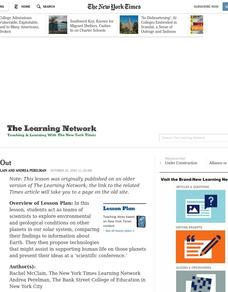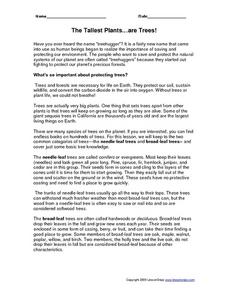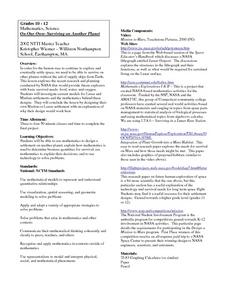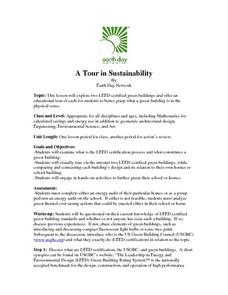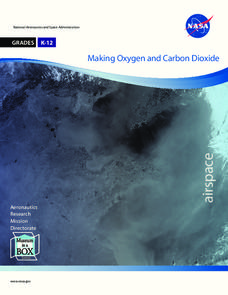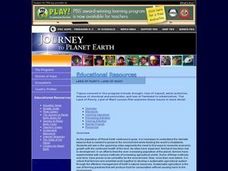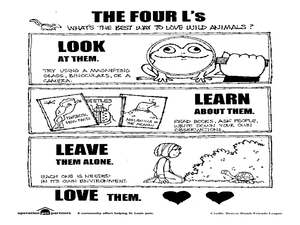Curated OER
Water Use and Conservation
Students discuss the different types of water found on Earth. They discover why not all water is used for drinking and calculate how much water they use. They create their own water conservation plan.
Curated OER
Save Our Soil
Pupils gain an understanding of the small amount of soil available to sustain humans on earth and complete an appropriate graph or chart from their collected data. They locate some of the countries they have heard about where people do...
Curated OER
Spacing Out
Students explore environmental and geological conditions on other planets in our solar system, comparing their findings to information about Earth. They propose technologies that might assist in supporting human life on those planets.
Curated OER
The Water Cycle
In this water cycle learning exercise, students learn about the 3 different stages of the water cycle: evaporation, condensation and precipitation. They then solve the 12 problems on the page. The answers are on the last page.
Curated OER
Climate Change Challenge
Students participate in a demonstration in which they role-play polar bears and habitat components to demonstrate the impacts of climate change on the Arctic Ocean ecosystem.
Curated OER
The Tallest Plants ... are Trees!
A fabulous worksheet about trees awaits your students. They read a lengthy selection on the various parts of trees, then complete 13 fill-in-the-blank and matching questions about what they have read. An excellent reading comprehension...
Curated OER
Mountain Pine Beetles
Students research and develop power point presentations that answer the question, "What is changing our forests?" In this ecology lesson, students research the niche of Pine Beetles and their increased effect on the forests in...
Curated OER
Entering the Twilight Zone
Young scholars describe major features of cold-seep communities and the process of chemosynthesis as it relates to organisms in each habitat. In this deep-sea habitats lesson, students study the categorization of ocean...
Curated OER
Sustainable Southern Belize: Coral Health Lesson Plan
Fifth graders investigate coral reefs and the dangers they face by labeling and drawing. In this oceanography lesson, 5th graders view a PowerPoint presentation of photographs of coral reefs in Belize. Students investigate...
Curated OER
Model UN Simulation on Population Control Policies
Students participate in a Model UN Simulation Activity in which they take the role of country delegates and NGO representatives in an attempt to develop and debate resolutions that seek to provide remedies to the problems of...
Curated OER
On Our Own- Surviving on Another Planet
Students investigate current models for Lunar and Martian settlements and study the mathematics behind these designs. They design their own Lunar or Martian settlement with an explanation of why their model would work best.
Curated OER
A Tour in Sustainability
Young scholars explore two LEED certified green buildings. They examine what is the LEED certification process and what constitutes a green building. They tour via the internet two LEED certified green buildings, while comparing and...
NASA
Making Oxygen and Carbon Dioxide
Some like it hot! Scholars observe both exothermic and endothermic reactions as part of the carbon dioxide oxygen cycle. First, scientists demonstrate (or watch) a chemical reaction to create pure oxygen using fire for...
K5 Learning
Space Based Astronomy
How much astronomy can you study with the naked eye? Learn more about the ways scientists explore the galaxy with a short reading passage and set of short-answer questions.
Curated OER
The Water Cycle and Watershed
Students summarize the steps in the water cycle. For this earth science lesson, students create a skit, song or poem showing the various components of the cycle. They identify the different watersheds in their area.
Curated OER
Land of Plenty, Land of Want
Young scholars view a video about the state of the environment. They discover the topic of sustainable agriculture. They identify problems and how to solve them.
Curated OER
WaterWeb
In this water worksheet, students answer 10 multiple-choice questions about the water cycle. Students also describe how they think their community is involved in sustaining water resources and write a pretend radio announcement about...
Curated OER
The Urban Explosion
Students investigate the uncontrolled development of the world's major cities. They define key vocabulary terms, view and discuss video excerpts, and complete a project that involves drawing a "perfect city," developing a plan to...
Curated OER
Geographic Features and Human Settlements
Third graders examine geography and settlements. In this geography lesson, 3rd graders participate in classroom activities that center on the idea that people settle where there are geographical features that sustain life.
Curated OER
Cherishing the Water of Life
Students work in small groups to brainstorm a list of all creatures, plants, natural, and artificial processes that use or depend on fresh water. The class views an aquarium filled with water representing all the water in the world. The...
Curated OER
Air and Water in the Environment
Students explore the traits of water condensation and evaporation. In this water cycle lesson, students develop an awareness of the importance of water for sustaining life. Students participate in a hands-on activity in which water is...
Curated OER
Round and Round-The Water Cycle
Students explore the water cycle. In this earth science activity, students work in small groups to read various books on the water cycle and take notes on chart paper. Students share their notes and teach a younger audience what they...
Curated OER
Wonderfully Wild Unit the four L's of Wildlife
Students appreciate the natural environment. In this "four L's" instructional activity, students observe, reflect and appreciate unique ecosystems and how they help sustain life. Students create posters with the four L's.
Curated OER
Lakes and Ponds
Students describe and recognize the difference between a lake and a pond. They name six ways in which a lake or pond can be formed. They describe the importance and act of evaporation on a waterway.




